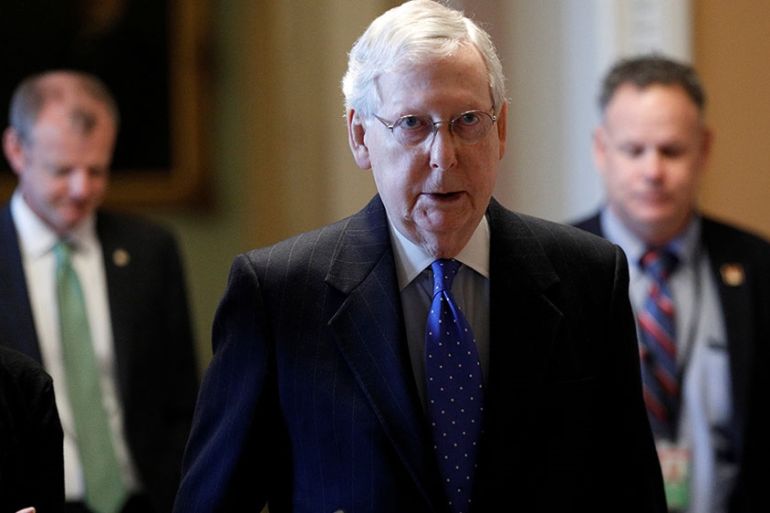US Congress passes coronavirus aid for families, workers
Measure heads to Trump’s desk as negotiations continue for broader economic stimulus bills.

Washington, DC – The Republican-led United States Senate overwhelmingly approved a bill backed by US President Donald Trump that guarantees free coronavirus testing for Americans and provides assistance for families and workers affected by the outbreak.
The Senate approval on Wednesday sends the bill to the White House for Trump’s signature.
Recommended Stories
list of 2 items- list 1 of 2Doctor’s Note: What are ‘underlying health conditions’?
- list 2 of 2What happens if you catch the new coronavirus?
At the same time, Congress began work with Trump administration officials to develop a larger measure that would inject up to one trillion dollars into the US economy, officials said.
“This is a very unique situation in this economy. We have put a proposal on the table that would inject a trillion dollars into the economy,” Mnuchin said after meeting with Republican senators on Tuesday.
As many as one in five American workers have already lost their jobs or had their hours reduced as businesses across the country shut down or cut staff in response to the health emergency, according to a new Marist poll.
“Across the United States, we are coming to realise that this is an exceptional health crisis the likes of which we have never seen,” said Senator Dick Durbin, a Democrat.
The number of confirmed COVID-19 cases in the US surged to 7,324 on Wednesday, an increase of 2,120 over the previous day, according to data collected by Johns Hopkins University. Those numbers are expected to rise sharply as testing for the virus becomes more widely available.
Titled the Families First Corona Virus Response Act, the bill approved by the Senate on Wednesday was drafted last week in negotiations between House Speaker Nancy Pelosi and Trump Treasury Secretary Steve Mnuchin.
The bill provides open-ended authority for federal spending in excess of three billion dollars for expanded food assistance and unemployment benefits.

Most workers who do not currently have paid sick leave from their employers would get 14-days of paid leave under the bill if they have to be out because of the outbreak. Small businesses under 50 employees can be exempted from the requirement.
Companies with more than 500 employees are not mentioned in the bill, but would be subject to Department of Labor policies. Nearly one in 10 employees at big companies do not have paid sick leave, according to DOL statistics.
The bill provides for 12 weeks of paid family leave – up to two-thirds of an individual’s pay – for workers with children whose schools closed. The benefit would be capped at $200 a day.
Gig workers and the self-employed individuals would get similar benefits via a federal tax credit.
The bill also includes waivers for US public school systems to allow school lunch funds to be redirected to provide meals for children during the outbreak.
Other measures
Senate Republican leader Mitch McConnell predicted there would be “overwhelming bipartisan” support for the larger economic stimulus legislation under negotiation now.
“We are examining policy tools to put money directly and quickly into the hands of American families,” McConnell said.
US legislators jumped this week to offer a variety of ideas for helping businesses and workers survive the economic strain of the widespread shutdowns caused by the virus outbreak.
Senate Democrats have proposed a separate $750bn package of economic support measures.
“Our proposal mainlines money into small businesses quickly,” said Senator Chuck Schumer, the Democrat leader.

McConnell said he had designated three “task forces” of senators to collect and filter proposals. He set a Thursday morning deadline for any additional proposals.
Republican Senator Marco Rubio said he would seek to include a programme of government-backed cash transfers from banks to small businesses that would likely not have to be paid back.
“In the absence of that, you are going to have mass closings of small businesses and a huge surge in unemployment,” Rubio said.
The stimulus bill may also include a bailout for the US aviation industry, as well as travel and hospitality companies that have ground to a virtual halt as Americans stay home.
“Aviation is burning cash very quickly,” said Senator John Thune, the number-two Senate Republican.
“We’re going to get help to the small businesses and the large businesses that have been dramatically impacted by the virus,” said Senator Mitt Romney, a Republican.

Congress approved an $8.3bn emergency spending package earlier to provide extra funding to healthcare agencies the Centers for Disease Control and the National Institutes of Health to combat the coronavirus.
Senators pledged to remain at work in Washington, DC, to provide the legislation needed to combat the virus and its economic effects.
“We’re going to help the American family and American workers. That’s the job we’ve got to do. And we are not going to leave this building until we get the job done,” Romney told reporters at the Capitol.